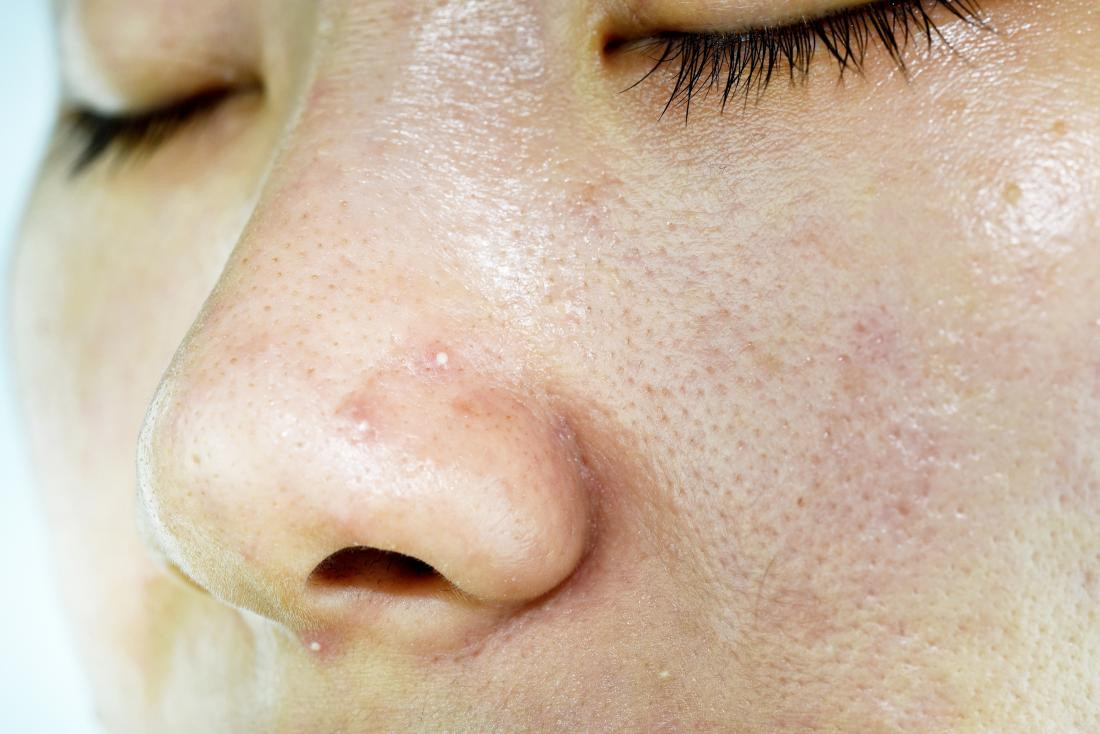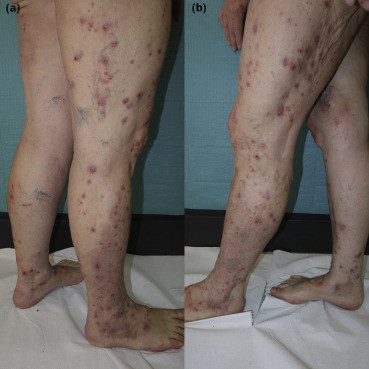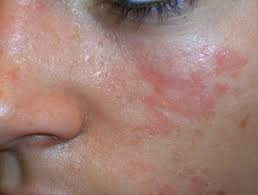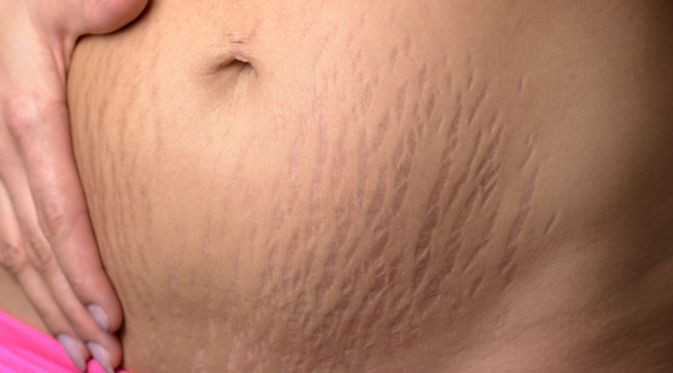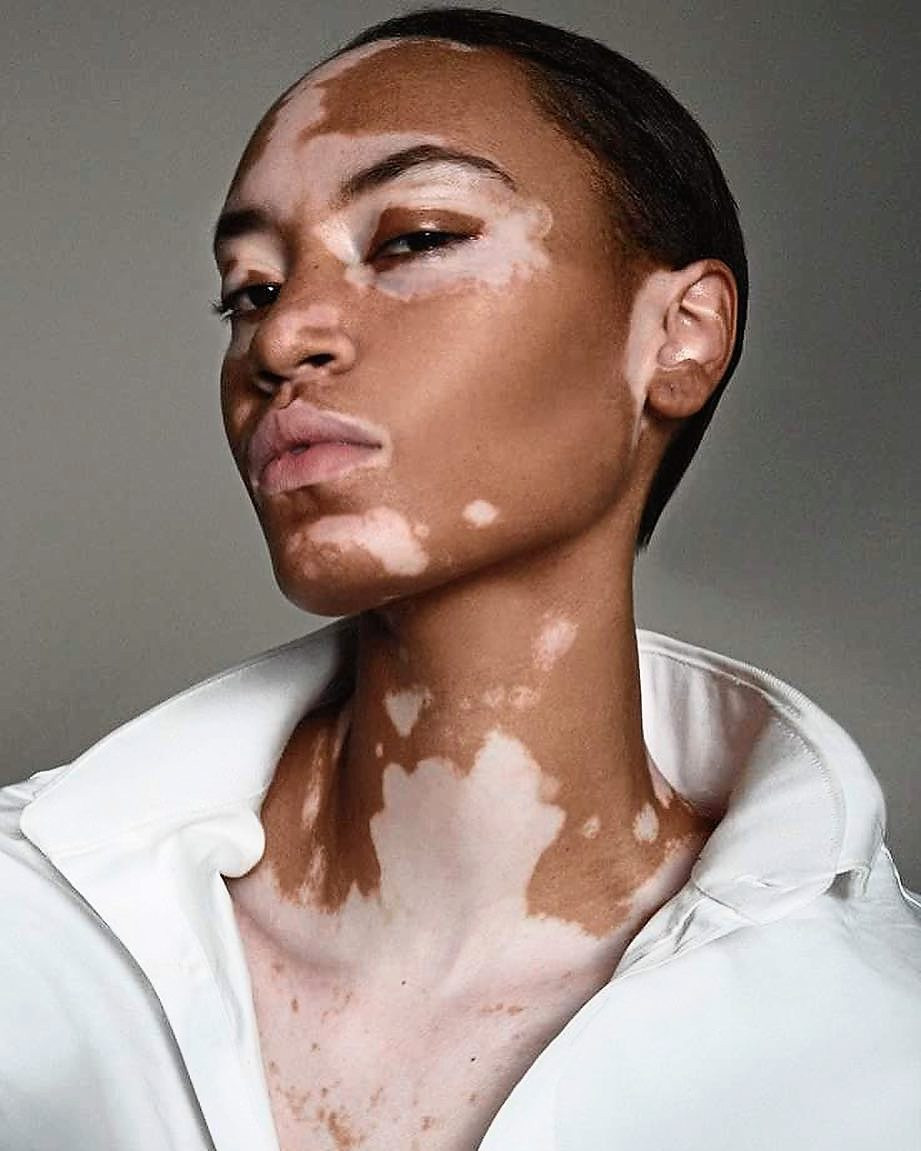Definisi
Kulit berminyak merupakan sebuah kondisi ketika kulit terlalu berminyak. Normalnya, setiap orang memiliki minyak pada kulitnya, yang disebut sebagai sebum. Sebum dihasilkan oleh kelenjar minyak, yang berada di bawah setiap pori kulit. Sebum berfungsi untuk menjaga kulit agar tetap lembab dan sehat.
Penyebab
Kulit berminyak disebabkan oleh produksi sebum yang terlalu tinggi. Pada umumnya, orang dengan kulit berminyak tidak memiliki masalah medis lainnya. Namun, beberapa masalah medis tertentu terkait dengan kulit berminyak, misalnya penyakit Parkinson (penyakit yang terjadi karena penurunan jumlah hormon dopamin pada otak) dan akromegali (peningkatan jumlah hormon pertumbuhan).
Selain itu, pada wanita, kulit berminyak dapat menjadi penanda adanya peningkatan hormon androgen, misalnya akibat sindrom ovarium polikistik (polycystic ovarium syndrome, PCOS) atau kondisi yang lebih jarang seperti hiperplasia adrenal kongenital (pembesaran kelenjar anak ginjal yang terjadi secara bawaan).
Faktor Risiko
Faktor risiko kulit berminyak adalah sebagai berikut:
1. Faktor Genetik
Kulit berminyak biasanya terjadi pada keluarga. Jika salah satu orang tua Anda memiliki kulit berminyak, kemungkinan Anda untuk mengalami kondisi serupa lebih tinggi.
2. Usia
Semakin tua usia, semakin rendah produksi minyak pada kulit. Oleh karena itu, orang dengan usia tua memiliki kulit yang cenderung lebih kering, sehingga keriput mulai terlihat dengan jelas.
3. Tempat Tinggal dan Musim
Kulit cenderung lebih berminyak di daerah yang panas dan lembab. Selain itu, kulit juga cenderung lebih berminyak pada musim kemarau atau musim panas dibandingkan dengan musim hujan, gugur, atau dingin.
4. Pembesaran Pori
Pori-pori kulit dapat melebar akibat usia, perubahan berat badan, dan iritasi kulit. Pori yang lebih besar juga memproduksi lebih banyak minyak.
5. Kesalahan Penggunaan Produk Perawatan Kulit
Kulit berminyak juga dapat disebabkan oleh kesalahan penggunaan produk perawatan kulit. Beberapa orang dapat salah mengartikan kulit kombinasi sebagai kulit berminyak, sehingga menggunakan krim wajah yang berlebih.
6. Rutinitas Perawatan Kulit yang Berlebihan
Kulit berminyak dapat disebabkan oleh mencuci wajah atau eksfoliasi (mengangkat sel kulit mati) yang terlalu sering. Hal ini mungkin terdengar aneh karena mencuci wajah dan eksfoliasi dilakukan untuk menghilangkan minyak. Jika kedua hal ini dilakukan terlalu sering, jumlah minyak pada kulit akan tersisa terlalu sedikit. Hal ini menyebabkan kelenjar minyak akan menghasilkan lebih banyak minyak untuk menutupi kekurangan tersebut.
Gejala
Gejala kulit berminyak adalah sebagai berikut:
- Penampakan berkilau atau berminyak
- Pori-pori yang terlalu tampak atau besar pada kulit
- Kulit yang tampak tebal atau kasar
- Jerawat yang sering atau kadang berulang
- Pori yang tersumbat dan blackhead (bintik hitam)
Keparahan kulit berminyak berbeda-beda pada setiap orang. Tidak hanya itu, gejala dan keparahan kulit berminyak dapat berubah seiring dengan usia, tempat tinggal, hormon, dan stres.
Diagnosis
Diagnosis kulit berminyak dapat dilakukan dengan pengamatan terhadap kulit wajah. Selain itu, dokter dapat menanyakan faktor risiko terkait kulit berminyak seperti riwayat keluarga, tempat tinggal, serta produk perawatan kulit yang dipakai sehari-hari. Hal ini dapat membantu dokter mendiagnosis kondisi Anda serta menentukan terapi yang tepat bagi kondisi kulit Anda.
Tata Laksana
Kulit berminyak tidak dapat sepenuhnya dihilangkan, namun dapat dikontrol. Untuk mengontrol kulit berminyak, Anda disarankan untuk:
1. Mencuci wajah Anda setiap pagi, malam, dan sesudah olahraga
Ketika Anda membersihkan wajah, Anda perlu menahan diri untuk tidak menggosok wajah Anda terlalu keras, meskipun untuk membersihkan makeup. Menggosok wajah terlalu keras dapat melukai kulit, sehingga tampak lebih parah.
2. Memilih produk perawatan kulit dengan label “bebas minyak” (oil-free) dan “nonkomedogenik”
Hal ini berarti produk perawatan kulit seperti pembersih, pelembap, dan makeup tidak akan menutupi pori-pori Anda atau menyebabkan jerawat. Selain itu, jangan menggunakan pembersih wajah berbasis minyak atau alkohol, karena produk-produk seperti ini dapat melukai kulit Anda. Produk makeup yang dipilih juga harus bebas minyak dan berbasis air.
3. Menggunakan sabun pembersih wajah yang lembut dan berbusa
Banyak orang percaya bahwa mereka harus menggunakan sabun pembersih wajah yang kuat untuk kulit berminyak agar kulit lebih kering. Namun, sabun pembersih wajah yang terlalu kuat dapat melukai kulit dan meningkatkan produksi minyak. Anda dapat mencari sabun pembersih wajah yang lebih ringan untuk kulit.
4. Menggunakan pelembap setiap hari
Meskipun Anda memiliki kulit berminyak, Anda tetap perlu menggunakan pelembap untuk menjaga kelembapan kulit Anda. Untuk melindungi kulit Anda dari sinar matahari, Anda dapat mencari pelembap yang memiliki tabir surya dengan kadar SPF 30 ke atas.
5. Menggunakan tabir surya saat berkegiatan di luar ruangan
Tabir surya dapat melindungi kulit Anda dari kerusakan yang menyebabkan keriput, noda usia, dan bahkan kanker kulit. Untuk mencegah timbulnya jerawat berlebih (breakout), Anda dapat menggunakan tabir surya yang mengandung seng oksida dan titanium dioksida, dan tidak menggunakan tabir surya yang mengandung parfum atau minyak
6. Menggunakan kertas minyak setiap hari
Anda dapat menggunakan kertas minyak dengan menekan kertas minyak dengan lembut pada wajah Anda, kemudian menunggu beberapa detik agar kertas tersebut menyerap minyak. Jangan menggosokkan kertas pada wajah, karena hal ini menyebarkan minyak ke bagian wajah lainnya. Selain itu, pastikan Anda selalu membersihkan makeup sebelum tidur.
7. Jangan menyentuh wajah Anda sehari-hari
Godaan untuk menyentuh wajah adalah hal yang sulit dihindari. Menyentuh wajah dapat menyebabkan kotoran, minyak, dan bakteri dari tangan ke wajah. Anda disarankan untuk menyentuh wajah hanya ketika membersihkan, melembapkan, mengoleskan tabir surya, atau memakai makeup. Ketika Anda hendak melakukan hal-hal tersebut, sebaiknya Anda mencuci tangan terlebih dahulu.
Jika kulit Anda berminyak sangat parah, dokter dapat meresepkan obat-obatan tertentu seperti retinoid atau isotretinoin untuk menangani jerawat, serta terapi hormon antiandrogen pada wanita. Obat-obatan ini sebaiknya tidak diberikan di luar resep dokter.
Komplikasi
Komplikasi kulit berminyak adalah risiko jerawat yang lebih tinggi, karena lebih mudah kotor, serta pori-pori lebih mudah tersumbat. Bagian wajah yang terlalu berminyak juga dapat tampak merah, berminyak, dan bersisik, yang merupakan gejala dari dermatitis seboroik.
Pencegahan
Kulit berminyak yang terkait dengan genetik dan hormon sulit untuk dicegah. Pencegahan terbaik untuk kulit berminyak adalah menemukan rutinitas perawatan kulit terbaik, dan konsisten menjalankannya tanpa mengganti produk. Jika kulit berminyak, Anda mungkin akan tertarik untuk menutupinya dengan makeup. Namun, Anda perlu berhati-hati dalam memilih produk makeup. Sebaiknya, Anda menghindari produk berbasis minyak, karena produk ini dapat memperparah kulit berminyak atau bahkan menyumbat pori-pori kulit Anda. Sebagai gantinya, Anda dapat menggunakan produk makeup berbasis air, atau bahkan tidak memakai makeup sama sekali.
Selain itu, Anda juga dapat mencegah kulit berminyak dengan mengontrol makan dan minum. Minum air dalam jumlah yang cukup setiap harinya dapat menjaga wajah agar tetap lembap. Selain itu, Anda disarankan untuk menghindari makanan yang terlalu berminyak atau mengandung lemak trans. Anda juga dapat mengonsumsi makanan yang kaya nutrisi dan berasal dari bahan pangan alami.
Kapan Harus ke Dokter?
Kulit berminyak jarang menyebabkan komplikasi yang terlalu parah, namun dapat menimbulkan rasa malu dan menurunkan rasa percaya diri. Jika Anda khawatir dengan kondisi kulit berminyak, Anda dapat berkonsultasi pada dokter umum atau dokter spesialis kulit, terutama apabila terapi di atas tidak mempan untuk menangani kondisi Anda.
Mau tahu informasi seputar penyakit lainnya? Cek di sini, ya!
- dr Nadia Opmalina
Brennan, D. (2020). Remedies for Oily Skin. Retrieved 10 May 2022, from https://www.webmd.com/skin-problems-and-treatments/remedies-oily-skin
Cherney, K., & Whitworth, G. (2018). What Are the Causes of Oily Skin?. Retrieved 10 May 2022, from https://www.healthline.com/health/oily-skin-causes
How to control oily skin. (2022). Retrieved 10 May 2022, from https://www.aad.org/public/everyday-care/skin-care-basics/dry/oily-skin
Johnson, J., & Cobb, C. (2020). Oily skin: 6 treatments, causes, and prevention. Retrieved 10 May 2022, from https://www.medicalnewstoday.com/articles/321090


